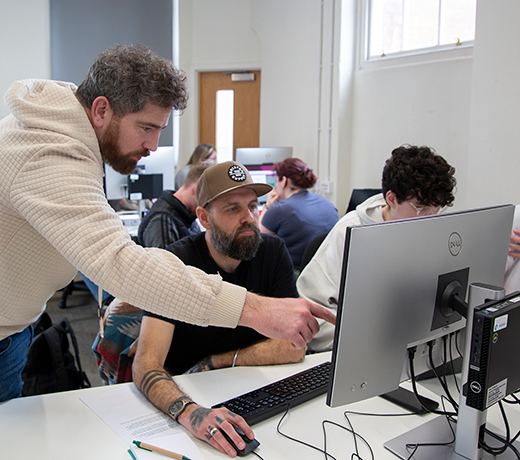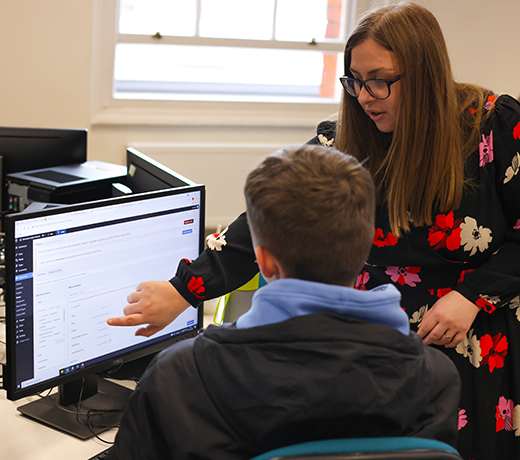At Worcester, you will have opportunities to apply your skills through a series of live projects, meaning you can gain experience of the real challenges faced in the industry.
of graduates in work or further study after 15 months
Gain additional qualifications and certificates as part of your course
University of the Year finalist
Recognised for our graduate success, we’re shortlisted for University of the Year in the Times Higher Education Awards 2025.
Overview
You’ll develop knowledge and practical skills that support the protection of systems, networks and data on a variety of levels (such as individual, business, critical national infrastructure) – all supported by a sound understanding of computing principles.
You'll explore planning methods and tools, learn cybersecurity policies and law, investigate strategies of defence and offence and gain an appreciation for human behaviours and needs.
The course:
- Is designed in consultation with employers, aligned with industry standards and taught by experienced computing professionals
- Gives you the option of a paid placement year to enhance your employability
- Includes live work-based projects, allowing you to earn as you learn and gain experience
- Has the option to gain additional professional qualifications and certification during your degree to build your CV
Optional year in industry
A year in industry option is available, allowing a more intensive employment experience. This extends the length of your course to 4 years and is completed between years 2 and 3.
We will support you with finding a placement that meets your career aspirations. We will also help to prepare you for this year by working with you on CV writing and interview skills.
You'll be entitled to the addition of 'with Placement Year' to your degree title.
Discover our cyber security lab
Course content
Our courses are informed by the latest research and feedback from students, examiners and employers.
We regularly review our courses to reflect the latest research and developments in the subject area, as well as feedback from students, employers and the wider sector. As a result, modules may change to ensure the course remains current and relevant.
Optional modules will run if enough students choose to study them. It is not guaranteed that all modules will be offered every year.
Careers
Data is a critical business asset that must be protected from cyber criminals trying to steal or hold data to ransom. That’s why developing a strong cyber security strategy is a top priority for all organisations.
Demand for cyber security talents is increasing as cyber threats continue to rise and grow more powerful. According to recent study into the UK cyber security labour market, carried out on behalf of the Department for Digital, Culture, Media and Sport (DCMS), a high proportion of UK businesses continue to lack staff with the technical, incident response and governance skills needed to manage their cyber security.
On this course, you will develop specialist skills and knowledge in the field of cyber security, focusing on areas and topics that are seeing high interest and growth in this fast-paced and exciting industry.
The course builds in employment preparation workshops, which include CV writing, mock interviews/assessment centres and meetings with employers to enhance your job prospects.
This course will provide graduates with a range of career opportunities in business, Government and law enforcement.
Potential career paths include:
- Cyber security analyst
- Ethical hacker
- Cyber security engineer
- Information security officer
- Digital forensics analyst
Course highlights
Teaching and assessment
Our course has been designed by academics and industry specialists to prepare you for a career in cyber security. You’ll be taught through a combination of practical activities, seminars, lectures, and one-to-one tutoring.
Evaluation isn’t just about exams. Our applied assessment methods include reports, portfolios, software artefacts, and presentations – preparing you for the work you’ll be doing when you graduate.
Teaching and assessment contents
You will be taught through a combination of interactive workshops, lectures, seminars, laboratory practical sessions, practical activities, etc.
Some examples include:
- Interactive workshops take a variety of formats and are intended to enable the application of learning through discussion and small group activities and can incorporate short lectures, worksheets and tutor supported activities.
- Flipped lectures where lecture content and activities are provided prior to an interactive workshop to provide background and context to the sessions.
- Seminars enable the discussion and development of understanding of topics covered in lectures, and laboratory practical sessions are focused on developing subject specific skills and applied individual and group project work.
We also make use of real-world case studies, oral presentations, mock examinations ,hands-on experience working with contemporary data analytic tools and programming environments, guest speaker inputs, and self-directed research. Students do not merely learn in isolation and using the university Virtual Learning Environment allows for online collaborative activities to take place. In addition, meetings with Personal Academic Tutors are scheduled on at least four occasions in the first year and three occasions in each of the other years of a course.
The University places emphasis on enabling students to develop the independent learning capabilities that will equip them for lifelong learning and future employment, as well as academic achievement. A mixture of independent study, teaching and academic support from Student Services and Library Services, and the Personal Academic Tutoring system enables students to reflect on progress and build up a profile of skills, achievements and experiences that will help them to flourish and be successful.
Meet the team
Here are a few of the Business School staff members who teach on this course.
Entry requirements
UCAS tariff points required: 104
| Qualification | Grade |
|---|---|
| A-level | BCC |
| BTEC National Extended Diploma | DMM |
| T-level | Merit |
We do accept Access to HE Diplomas and other qualifications which may not exactly match the combinations above. Work out your estimated points with the UCAS tariff calculator.
Any questions?
If you have any questions about entry requirements, please call our Admissions Office on 01905 855111 or email admissions@worc.ac.uk.
Fees
Fees contents
UK and EU students
In 2026/27 the standard fee for full-time home and EU undergraduate students on BA/BSc/LLB degrees and FdA/FdSc degrees is £9,790 per year.
Tuition fees are reviewed annually and may increase each year for both new and continuing students.
For more details on course fees, please visit our course fees page.
International students
In 2026/27 the standard tuition fee for full-time international students enrolling on BA/BSc/LLB degrees and FdA/FdSc degrees is £17,200 per year.
Tuition fees are reviewed annually and may increase each year for both new and continuing students.
For more details on course fees, please visit our course fees page.
How to apply
How to apply contents
Applying through UCAS
UCAS is the central organisation through which applications are processed for full-time undergraduate courses in the UK.
Read our how to apply pages for more information on the application process, or if you’d like to apply for part-time study.
Contact
If you have any questions, please get in touch. We're here to help you every step of the way.

Akinola Olumide Siyanbola
Admissions Tutor and Lecturer in Web Application Development
a.siyanbola@worc.ac.ukAdmissions Office
admissions@worc.ac.uk01905 855111More to explore
Open Days
Visiting us is the best way to get a feel for student life at the University of Worcester.

The City of Worcester
Worcester is a welcoming university city with great transport links and plenty of student parking.

Accommodation
Benefit from our accommodation guarantee. We have rooms on campus to suit every budget including en-suite options.










